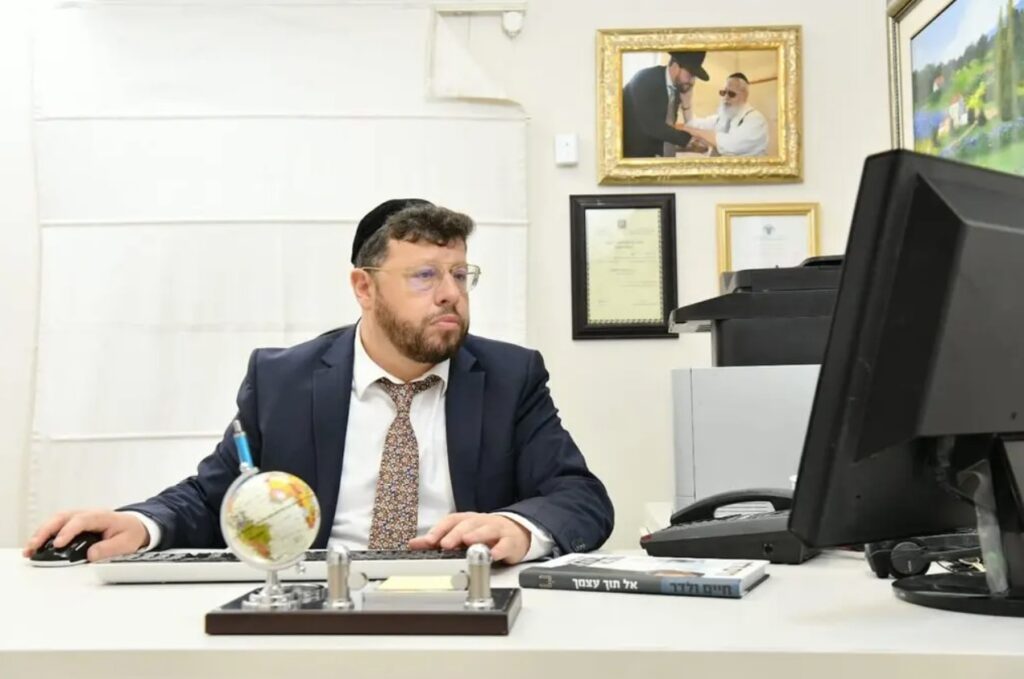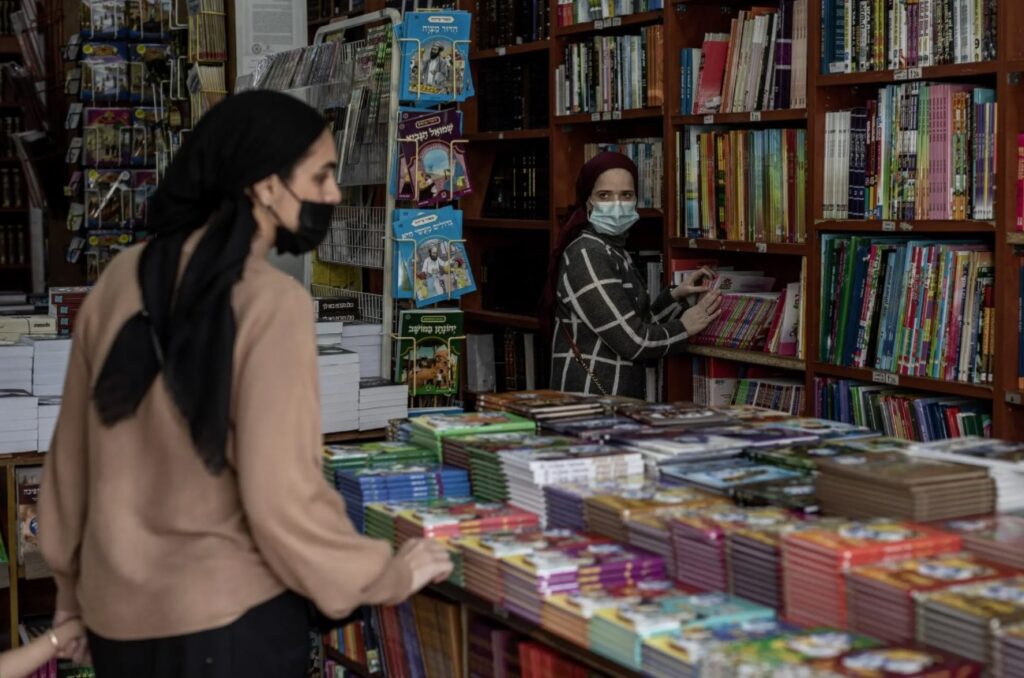BNEI BRAK (ISRAEL)
New York Times [New York NY]
January 27, 2022
By Isabel Kershner
An acclaimed religious children’s author was accused of abusing women and children. Then he killed himself, sending shock waves through the conservative community.
For the ultra-Orthodox public in Israel, he was a charismatic mix of soul healer, role model and media star.
So it came as a great shock when Chaim Walder, a celebrated and prolific author of children’s books, commentator and child and family counselor, was accused of sexual assault and abuse of women and children.
Coming months after the exposure of sexual abuse accusations against Yehuda Meshi-Zahav, another prominent, albeit less liked, figure in the ultra-Orthodox community, some have described the Walder affair as a #MeToo moment for Haredim, the Hebrew term for the ultra-Orthodox, which means those who tremble before God.
“It’s historic,” said Avigayil Heilbronn, an activist from a strict religious background who has long campaigned on behalf of ultra-Orthodox victims of sexual abuse and describes herself as a “new” or modern Haredi, a feminist with a more liberal attitude.
“The abusers are running scared,” she added, as more victims were coming forward.
The episode reflects not only the deep-seated culture clash between ultra-Orthodox and secular Israelis, but also a growing divide between the increasing numbers of modern Haredim, like Ms. Heilbronn, who interact on social media and are more open to the outside world, and those who remain resistant to any kind of intrusion or exposure.
The first allegations of abuse against Mr. Walder, 53, surfaced in mid-November in an investigation by the secular newspaper Haaretz, rocking the insular world of the ultra-Orthodox.
By late December, a special rabbinical court convened by the chief rabbi of Safed, a town in northern Israel, said it had heard convincing accusations of abuse against Mr. Walder involving 22 women and girls, with some of the testimony coming from the accusers themselves, and added that the Torah viewed such soul-destroying acts as akin to murder.
The accusers have remained anonymous, but the court said their cases were likely to constitute only a fraction of Mr. Walder’s “evildoing” over decades. It called on him to repent.
Instead, in another jolt, on Dec. 27, the same day that the police said they were opening an investigation, Mr. Walder killed himself on the grave of his son. He left a handwritten note threatening two rabbis who had come out against him with a “Torah trial in heaven” and protesting his innocence.

But Haredi society is complicated and the revelations created a tumultuous backlash. Initially, a few leading rabbis appeared to focus on the sin of gossip and the public shaming of Mr. Walder, essentially blaming the accusers for his death.
Activists on the fringes of ultra-Orthodox society, Ms. Heilbronn among them, responded with a highly unusual campaign to raise Haredi awareness about sexual predators and to support the victims. Over time, the rabbis who had supported Mr. Walder fell silent as other respected rabbis openly condemned him.
The question remains of how quickly or profoundly the more entrenched Haredi community can act to root out abusers given the chilling effect that victims may feel from Mr. Walder’s suicide — itself considered a violation of Jewish religious beliefs — and that explicit talk of anything to do with sex remains taboo.
Haredi publications alluded to the Walder episode in euphemisms such as “the upheaval” while refraining from mentioning him by name and largely ignoring what he was said to have done.
“Why? Because we are a conservative site,” said Yanki Farber, a correspondent for Behadrei Haredim, a leading ultra-Orthodox digital news platform headquartered in the city of Bnei Brak. “We don’t write about suicide or about pedophilia openly, so we did not write about this. Parents rely on us to filter the news.”
One Haredi publication, Mishpacha magazine, wrote an editorial denouncing those who looked the other way. And like other Haredim working in the news media, Mr. Farber wrote his own emotional Facebook post condemning the code of silence that he said was intended to shield young Haredim from sexual matters but had, in effect, ended up protecting rapists.
Mr. Walder lived and worked in Bnei Brak, a Haredi bastion just east of Tel Aviv. As well as writing and publishing his books for children and adults, he ran a children’s summer camp and founded the Bnei Brak-based Center for the Child and Family. He was employed by Bnei Brak’s city hall for many years as the administrator of that center.
He was the recipient of the Israeli government’s Protector of the Child award in 2003.
His children’s books can be found in almost every Haredi household. The 14th volume of his popular series “Kids Speak” was recently published with endorsements from leading Haredi rabbis.

Unlike Mr. Meshi-Zahav, who was already persona non grata in the Haredi neighborhoods where he grew up, Mr. Walder was beloved by his community, which added to the shock.
Mr. Meshi-Zahav also tried to take his own life in April after being accused of preying on men, women, girls and boys, and remains in a coma. He had denied the allegations.
Both men have avoided a full police investigation and the trial that might follow. Few Haredi women ever go to the police to report abuse, generally lacking trust in the state authorities and fearing leaks to the mainstream media, according to members of the community.
The Israeli police said they were aware of the reluctance to submit complaints despite their efforts to investigate with maximum discretion, adding in a statement that they alone were authorized to deal with such criminal cases.
But Ms. Heilbronn established a grass-roots anti-abuse organization six years ago where victims could begin to share their stories, beginning with a Facebook page. It was named “Lo Tishtok,” Hebrew for “You Shall not be Silent.”
Ms. Heilbronn said a complaint about Mr. Walder was logged in the first month, but the woman involved said she could not act because she had signed a nondisclosure agreement with him. After three years, “Lo Tishtok” came under the umbrella of Magen, a Haredi help center whose activists have been instrumental in supporting the accusers of Mr. Meshi-Zahav and Mr. Walder.
Once Mr. Walder was publicly accused, he resigned from Bnei Brak city hall, and a Haredi newspaper and radio station dropped his weekly column and regular talk show. Two Haredi rabbis openly called for his books to be taken off the shelves. A well-known bookseller in Brooklyn, Eichlers Judaica, said it would no longer carry his books even though they were best sellers.
After Mr. Walder’s well-attended funeral, where supporters eulogized him, anti-abuse activists set up an online crowdfunding campaign and volunteers distributed about a million leaflets in Haredi communities across the country, expressing support for the accusers and including quotes from respected rabbis.
One of those who delivered a eulogy later apologized for it.
Yet in Bnei Brak this month, it was apparent that the campaign for greater openness on the abuse issue was having only a limited impact.
Leaflets from the campaign were strewn in a yard or trampled underfoot. Bookstores were still prominently displaying Mr. Walder’s children’s books. One bookseller said he had received no complaints; another said it was just good business.
On bustling Rabbi Akiva Street, few were willing to speak about the Walder affair and those who would speak refused to be identified.
Malki, 34, a mother of seven who works in an accessory store and would give only her first name, said Mr. Walder’s suicide had increased suspicions against him, and that there were others like him. But because he was no longer in this world, nothing was clear, she added.
She said she had told her own children all the time to beware of strangers and to tell her if anything unpleasant happened to them.
But with about half the Haredi public now having at least some access to the internet, Mr. Farber, the Haredi news site correspondent, said the community had “wised up” and no longer needed the rabbis to tell them what was going on.
The fallout found some common ground with the #MeToo movement, said Israel Cohen, a leading ultra-Orthodox political commentator, who lives in Bnei Brak. Mr. Meshi-Zahav and Mr. Walder were high-profile enough to be compared, in Haredi terms, with the likes of Harvey Weinstein or Jeffrey Epstein, he said.
But Mr. Cohen cautioned that real change would have to come from inside, through rabbis and pure Haredi institutions, rather than through the work of activists on the fringes of this world.
Despite police efforts, the ultra-Orthodox community has preferred to deal with most of its problems internally, shunning state intervention and suspicious of outside authorities.
Eventually, Mr. Cohen said, the rabbis were likely to establish a forum to deal with complaints of abuse within the community.
“The quicker the better, in my opinion,” he added. “But knowing how things work in Haredi society, it can take time.”
Audio produced by Kate Winslett and Tally Abecassis.
